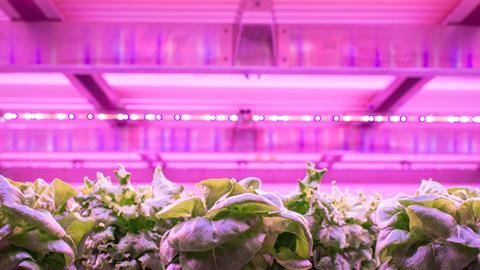Company that develops vertical farms producing leafy greens is up for sale just one year after £50m cash injection
Worcestershire-based Eider VF (EVF) has become the latest casualty in the global vertical farming sector, announcing that it has entered administration and is selling the business and its assets.
Internationally, the vertical farming industry has encountered major challenges in the past two years, not least soaring electricity prices, lower demand from cash-strapped consumers, and even higher construction costs.
Founded in 2016, EVF develops farms growing leafy produce for the UK mass market. Its products are grown in standard warehouses that are augmented to house vertical farms.
Last year it was reported that EVF had secured long-term partnership agreements with leading manufacturers and suppliers of leafy produce to the UK retail and foodservice markets.
In June 2022 Slate Asset Management invested £50m in EVF, with the asset manager saying the investment was made on behalf of the Cities and Communities Impact Infrastructure Strategy launched in February 2022.
At that time, Slate said its investment would be used to fund the construction of EVF’s first five facilities by 2024.
David Shambrook and Phil Armstrong of FRP Advisory Trading Ltd (FRP) were appointed administrators of Eider VF Limited on 15 May 2023, and have invited offers to acquire the business and its assets, with a deadline of 9 June 2023 for best and final offers.
For sale are the company’s leasehold property, its plant and machinery, fixtures and fittings, office equipment and furniture, and intellectual property.
Interested parties should contact FRP’s Anthony Druce at Anthony.Druce@frpadvisory.com.
In a statement, the administrators said: ”The business entered into administration after a period of challenging trading conditions left it unable to meet its financial obligations as they fell due. The business ceased trading on appointment and the 17 staff were made redundant.”
EVF was unavailable for comment.
On its website the company touts the environmental credentials of its vertical farming methods. The business claims that its facilities use 95 per cent less freshwater than conventional agriculture, and 85 per cent less land than growing outdoors, as well as producing over 21 times the yield generated through conventional farming methods.
It also emphasises that its crops are grown pesticide-free, 365 days a year, and in line with the goals of the National Food Strategy, for example when it comes to sustainable production, creating jobs, and boosting food security.
EVF is the latest in a string of businesses in the international vertical farming industry to run into financial difficulties. Agricool, a French business growing greens in recycled shipping containers, went into receivership in January.
Berlin-based vertical farming company Infarm announced in November that it was laying off around 500 workers (more than half of its staff) and downsizing its operations in the UK, France, and the Netherlands.
Meanwhile, IronOx, which built a high-tech robotic system to run its indoor farms, laid off nearly half of its workforce in November. And Israeli-Dutch vertical farming company Future Crops Cooperative was declared bankrupt in January.
Cindy van Rijswick, a strategist at the Dutch research firm RaboResearch, told Wired in December that several pressures that have always threatened vertical farms have come to a head in the past two years.
The industry is highly vulnerable to energy price rises, she emphasised, since powering so many LEDs requires a lot of electricity. When interviewed in December she estimated the average proportion of operational costs spent by a European vertical farm had increased from 25 to 40 per cent in the space of 18 months.




